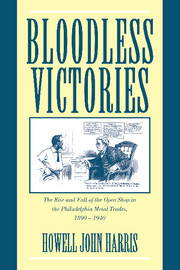Book contents
- Frontmatter
- Contents
- Figures and Tables
- Acknowledgments
- Abbreviations
- 1 Introduction
- 2 The Iron Masters
- 3 Laying the Foundations: Peace and War in the Metal Trades, c. 1890–1904
- 4 Combat, Crisis, and Consolidation, 1904–1915
- 5 “The Largest, Strongest, and Most Valuable Association of Metal Manufacturers in Any City”
- 6 Riding the Storm, 1915–1918
- 7 The War After the War, 1918–1923
- 8 Pacific Passage: Quaker Employers and Welfare Capitalism, c. 1905–1924
- 9 A Liberal Interlude: The Modernization of the MMA, c. 1924–1931
- 10 The Deluge: The Great Depression and the End of the Open Shop
- 11 The New World: Accommodation and Adjustment, 1936–1939
- 12 Afterword: “We'll Still Be There. We're Not Going Away”
- Appendix: Databases Referred to in Text: Nature, Sources, Use
- Index
8 - Pacific Passage: Quaker Employers and Welfare Capitalism, c. 1905–1924
Published online by Cambridge University Press: 21 September 2009
- Frontmatter
- Contents
- Figures and Tables
- Acknowledgments
- Abbreviations
- 1 Introduction
- 2 The Iron Masters
- 3 Laying the Foundations: Peace and War in the Metal Trades, c. 1890–1904
- 4 Combat, Crisis, and Consolidation, 1904–1915
- 5 “The Largest, Strongest, and Most Valuable Association of Metal Manufacturers in Any City”
- 6 Riding the Storm, 1915–1918
- 7 The War After the War, 1918–1923
- 8 Pacific Passage: Quaker Employers and Welfare Capitalism, c. 1905–1924
- 9 A Liberal Interlude: The Modernization of the MMA, c. 1924–1931
- 10 The Deluge: The Great Depression and the End of the Open Shop
- 11 The New World: Accommodation and Adjustment, 1936–1939
- 12 Afterword: “We'll Still Be There. We're Not Going Away”
- Appendix: Databases Referred to in Text: Nature, Sources, Use
- Index
Summary
The argument of this book has been that Philadelphia in the 1900s through early 1920s was actually a good, rather than simply a convenient, place in which to study the dynamics of labor–capital relations in the metal trades. What happened in the metal manufacturing industries of other major cities usually happened in Philadelphia too, generally at much the same time, and for many of the same reasons. The business communities, labor unions, and skilled workers who are the protagonists in this story were all reacting to the same great national events – particularly changes in the business cycle and the balance of political power, and the war. Local developments took place in a context shaped by national institutions, and the information and experience they circulated within and among themselves. The MMA thus stands as a representative for its two dozen sister associations that gave the NFA and the NMTA a grass-roots presence and prosecuted the Open shop war on the ground. It was cheaper than any of them, more conservative than some, less combative than others, and more successful than most. But its ideology, strategy, and practice were quite commonplace.
In another sense, too, Philadelphia looked like a microcosm of metal-trades labor relations nationwide: Great corporations held up the umbrella under which mid-sized businesses could find shelter from the rain. The metaphor is not exact and the protection was incomplete, but the successes of the NFA, the NMTA, and the local employers' associations are best understood alongside the anti-union climate created and maintained by the likes of U.S. Steel, International Harvester, and others.
- Type
- Chapter
- Information
- Bloodless VictoriesThe Rise and Fall of the Open Shop in the Philadelphia Metal Trades, 1890–1940, pp. 282 - 308Publisher: Cambridge University PressPrint publication year: 2000



